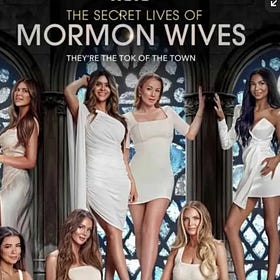My Mormon Explainer of the Secret Lives of Mormon Wives, Season 2
Heaven or holy girlboss hell? Fighting misogyny with...misogyny?
Please “like” this post via the heart below and restack it on Notes if you get something out of it. It’s the best way to help others find our work.
The best way to support us is with a paid subscription, starting at less than $5. Paid readers get access to all our paid posts, chats, and book club. And get to belong to something that Joe Rogan would hate. Win!
When Season 1 of the The Secret Lives of Mormon Wives came out, I couldn’t resist the Hulu reality series that follows eight young Mormon mom influencers in Utah, who formed a group of TikTokers known as “MomTok.” The show picks up after some fallings-out and a swinging scandal that went viral. Drama ensues.
I was raised Mormon, in Salt Lake City, and I write about patriarchy often through the lens of Mormonism. As I wrote then: A show about Mormon women misbehaving?? YESSSSSS.
Seeing young Mormon women and the subculture I was raised in on TV brought me a measure of joy, honestly. The stunning scenery of my hometown, the Utah hair, and the crazy name spellings of it all!
For Season 1, I wrote a fun explainer of Mormon culture replete with details on Dirty Diet Cokes, cheesy wardrobe aesthetics, trying to explain unexplainable Mormon food restrictions, and fond remembrances of my Utah youth that you can find here.
But Season 2 feels…well, not as fun.
Part of the fun of Season 1 was watching a group of young women wrestle with questioning patriarchy and their prescribed roles in real time.
But in Season 2 the wrestling with patriarchal systems has fallen away. Now, instead of uniting to question and push back on systems and forces that make women subordinate, now the women of MomTok are pitted against each other.
Oof. In other words, it’s just standard fare reality TV that weaponizes misogyny for drama—thus simply reinforcing the misogyny that the show’s characters were ostensibly questioning in the first place!
Season 2 has about all the female-empowerment charm of The Bachelor (which is to say, absolutely zero). Is there any form of entertainment that relies on misogyny, and depicting/exploiting women as “trashy” objects more than reality TV does? Probably not—but still this season of TSLOMW seems to be working overtime.
All of which is to say, the show really is a masterclass in how patriarchal culture works against women—including women who naively think they might be rising above it—to reinforce misogyny and turn women against each other.
I think what is interesting about TSLOMW S2 is that on the surface it’s about how patriarchal cultures like Mormonism subordinate women.
But what it puts on full display is that this isn’t a Mormon phenomenon, it’s a full-blown cultural phenomenon—from capitalistic social media, to reality TV, to family dynamics.
Is this show about “Mormon Wives,” or is it just about the way our culture treats women? Here are just a couple ways that the “Mormon Wives” reflect the reality that we all live in.
Misogynistic media loves a “catfight”: undermining female solidarity
The first big red flag of misogynistic tendencies in Season 2 is that the producers have done forensics-level research to dig up every scrap of possible drama that could torment these women. Every ex-lover and enemy that could strike chaos and dread in these young women’s lives is scrupulously researched, dug up, and introduced in Season 2. Do the creators of this show really hate women—or just these particular women—so much? Or are they just following a well-worn script that misogyny can sell even better than relentless soda product placements? Either way, they are going the extra mile to make these women miserable and humiliate them at every opportunity.
Every episode is a “party” or gathering that’s staged to force a bunch of people together who clearly don’t want to be in the same room together at all. Yet they are contractually obligated by Hulu to do just that. Then, some fire bomb is thrown into the episode in the form of the on-camera surprise appearance of an
Keep reading with a 7-day free trial
Subscribe to Matriarchy Report to keep reading this post and get 7 days of free access to the full post archives.





